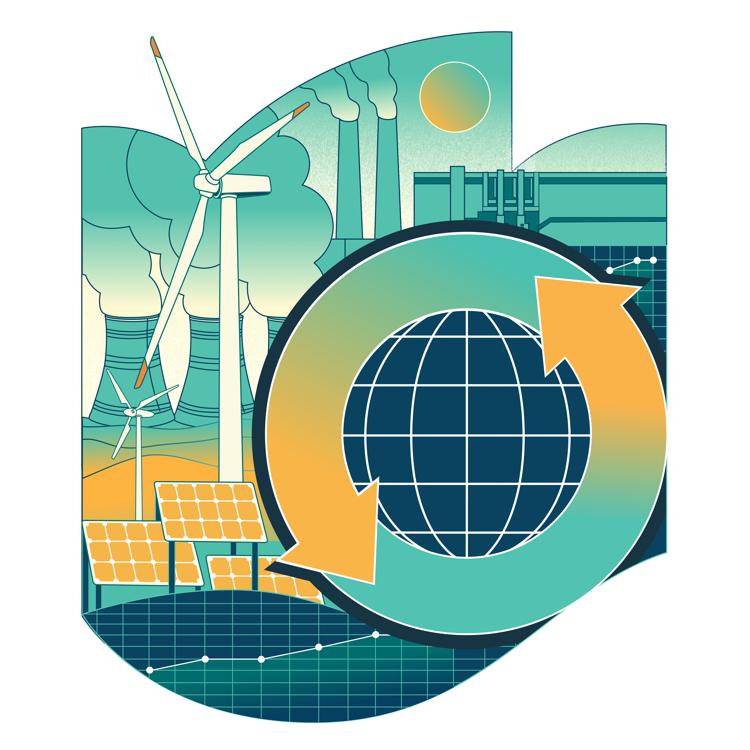 SHI YU/CHINA DAILY
SHI YU/CHINA DAILY
The Intergovernmental Panel on Climate Change's sixth assessment report, released earlier this month, brings together the most authoritative scientific research on climate change, describes and analyzes the climate impact under different emission scenarios, and provides key issues for the UN Climate Change Conference to discuss in Glasgow, Scotland, in November.
In particular, the IPCC report says that by 2040, the Earth's temperature will rise by 1.5 degrees Celsius; human-caused climate change is worsening extreme weather events around the globe; the global warming rate in the northern hemisphere will be two to four times higher than the global level; the Earth's climate is approaching an irreversible turning point; and the significant impact of methane on global warming has not received enough attention.
The IPCC released its first assessment report in 1990, and the succeeding reports have revealed the growing anxiety and tension among the climate scientists, and called for urgent action. Adding to our worries, the 2020 Emission Gap Report of the United Nations Environment Programme says that humans have largely missed the opportunity to use financial assistance and recovery measures to stimulate the economy and accelerate low-carbon transformation.
Amid all this, an old issue, carbon border adjustment mechanism (CBAM), has come to the fore thanks to the legislative moves in the European Union and the United States. The EU has taken the lead in this field by proposing on July 14 that it would establish a CBAM. It will finalize legislation in 2022, implement it in stages from 2023 and complete the implementation in 2026.
Five days later, on July 19, US Senator Chris Coons and Representative Scott Peters proposed the "Fair, Affordable, Innovative, and Resilient Transition and Competition Act", which says goods exported to the US by countries that have not sufficiently reduced their carbon emissions would be taxed according to their emission level.
The bill shows there are many carbon tariff supporters in the US. And if the Congress passes the bill, the US will levy carbon border tax on imported fossil fuels and commodities whose production involves high carbon emission such as aluminum, steel and cement from 2024. Since such products comprise up to 12 percent of the US' total imports, the administration could receive billions of dollars in additional tax revenue every year.
The EU's decision to establish a CBAM has been criticized by some economies. For example, Australian Trade, Tourism and Investment Minister Dan Tehan said, "the last thing the world needs now is additional protectionist policies," while the press secretary of the Russian president said, "this is extremely unpleasant". As the only major economy which refuses to set a specific carbon neutrality timetable, India is also opposed to the EU's legislation and has joined China, Brazil and South Africa to issue a joint statement saying the CBAM is "discriminatory".
These countries are opposing the carbon adjustment mechanism for several reasons.
First, the CBAM would place enterprises in developed economies such as the EU and the US and those in developing economies on an equal footing and thus levy equal amount of carbon tax on both. By doing so, it would violate the principle of "common but differentiated responsibilities". Which would be unfair to developing countries and inconsistent with the UN Framework Convention on Climate Change as well as the Paris Agreement.
Second, much evidence has been presented to show that the CBAM conflicts with World Trade Organization's regulations, so its implementation could have a negative impact on global trade.
Third, even if the EU's argument in favor of the CBAM is accepted, how will the amount and/or percent of carbon tax be deduced, and on what basis? For instance, even the method to calculate the carbon footprint of a product is extremely complex.
How will the EU authorities determine the carbon emission level of an imported commodity? How will they deduct the carbon tax (if any) already levied by the exporting country's government? And to what extent diplomacy can boost cooperation between different countries? These are some of the questions that have no ready answers. In fact, in 2018, the European Commission itself said such issues are "obviously unmanageable" in the short term.
When it comes to Sino-US relations, climate change is one of the few issues the two sides are still on the same page. But if the Congress passes the controversial bill and the administration starts imposing higher taxes on "high-carbon-emission" goods, Sino-US ties could worsen further.
According to the US bill, the least-developed countries will be exempted from paying the "high-carbon-emission" tax.
As for other countries, it will be up to the US government agencies to decide whether or not they can pay reduced taxes "in line with federal laws". This means there will be another huge gap between "your judgment" and "my truth", which will not be conducive to strengthening the Sino-US climate partnership.
When an entire village is burning, and families direct their respective water hoses at the hydrant to keep it cool instead of using it to extinguish the fire ravaging their own or their neighbor's house, the village cannot be saved.
This is exactly what the legislative moves of the EU and the US seem to be doing. The EU and the US appear determined to go ahead with the laws, but we still have reservations and doubts about them.
(Liu Yuanling, a researcher at the American Institute, Chinese Academy of Social Sciences.The views don't necessarily reflect those of this platform.)






